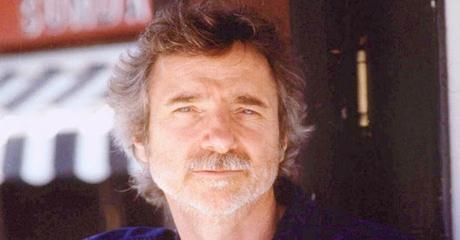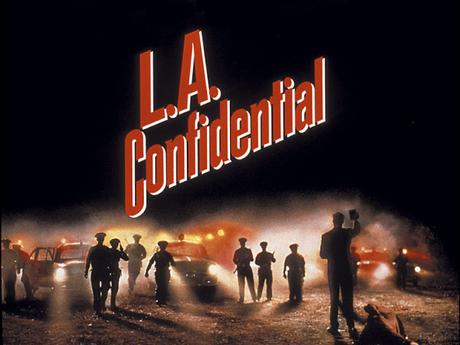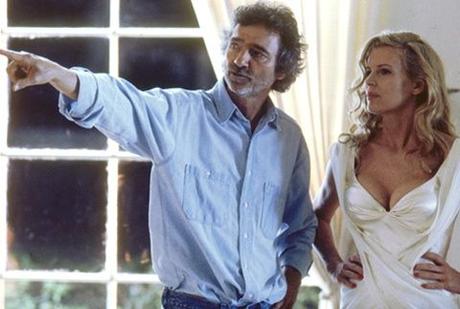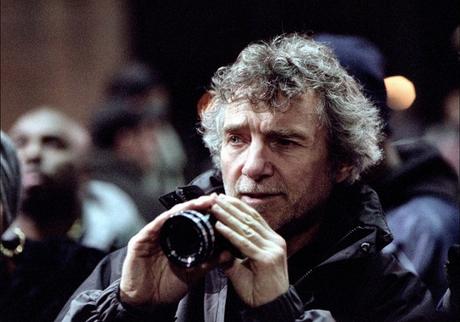
CURTIS HANSON--CONFIDENTIALLY
By
Alex Simon
Curtis Hanson was my first interview with a fellow film buff and film journalist. He was nice enough to sit down with me twice, first at the Rose Cafe in Venice, then at a lunch spot in the Marina, the name of which has been lost to time. He was kind enough to invite me to the world premiere of "L.A. Confidential" at the Chinese Theater, my first time on the red carpet at a real-life Hollywood premiere, and called me after this piece ran to thank me personally. A nice man. Hanson, and co-writer Brian Helgeland, would go on to win Best Adapted Screenplay Oscars for "L.A. Confidential."
Years later, I ran into Hanson at a book signing party for Pat York that was held in Westwood. I approached him and reminded him of our interview a decade or so earlier. His countenance had changed in the ensuing years and he grew instantly uncomfortable and defensive. The lady he was with took a protective stance with him and I quickly backed off. It wasn't the first time someone I'd seemingly hit it off with during an interview had given me a "Heisman" in public, but from coming from Hanson as I remembered him, it truly shocked me. He seemed the antithesis of "Hollywood asshole."
Not long after this encounter, I learned Hanson had been diagnosed with early onset Alzheimer's. I immediately felt awful, not just for the conclusion I'd mistakenly drawn, but for the loss of the many intelligent, entertaining films that surely still existed inside him. The news just dropped today that Hanson has passed, aged 71: no longer an old age.
In the meantime, though, we will always have his films. Rest in peace, sir.
Editor's Note: This article orginally appeared in the September 1997 issue of Venice Magazine.
It’s the beginning of the seventh grade in 1979 and my family has just re-located from Phoenix to Vancouver, Canada for the year. Taking my obsession with movies across the border with me, I hear about a new Canadian film that is creating a buzz called The Silent Partner, a thriller starring Elliot Gould and Christopher Plummer about a timid bank clerk who foolishly crosses a psychotic bank robber and the cat-mouse games that ensue. It’s also rated ‘R’ and supposedly has a really cool decapitation scene in a fish tank that has even the studliest of cast-iron stomach moviegoers reaching for their barf bags. As a lover of fine cinema, I decide that this I have to see. I round up my two new Canadian partners in crime, Chris and Bruce, and we take the bus down to Granville Street where it’s playing in a three theater multiplex along with The Muppet Movie and Avalanche Express, both of which we can get into. We decide to be true rebels and buy tickets to The Muppet Movie. Upon entry, like revolutionaries of the Che Guevara/Leon Trotsky mold that we are, we stealthily buy popcorn and sodas, waiting for just the right moment until the behemoth usher guarding The Silent Partner’s screening room door moves, or is distracted. Soon, the Behemoth's girlfriend shakes her tailfeathers and he goes running. As do we inside the theater and are dazzled by the cat-and-mouse story that unfolds before us. When the infamous decapation scene arrives, we all perform like true soldiers, never taking our eyes from the gore on-screen and/or reaching for our designated barf bags (not that any were provided for us). One sad note: Bruce (against my advice) snuck out for a bathroom break 3/4 of the way through the film and was promptly caught, stomped on and ejected by the Behemoth from the theater. He did return the following weekend, however, buying a ticket for Mary Poppins this time instead of The Muppet Movie to gain access.
From the final fade out of The Silent Partner, the film’s ingenious plot, razor-sharp dialog and mind-boggling plot twists stayed with me like a new-found love. The writing was just so smart. I made a mental note of the screenwriter’s name: Curtis Hanson, vowing to keep track of his work from then on. And I did.
Curtis Hanson was born in Reno and raised in Los Angeles. Hanson used his love of film to write for and eventually become the editor of “Cinema” magazine in the late 1960’s and 1970’s. His first two features were low-budget thrillers: an adaptation of H.P. Lovecraft's The Dunwich Horror and The Arousers, which he directed, both in 1970. He followed these with screenplays for The Silent Partner in 1978; the controversial and rarely-seen White Dog (1982) which was written with and directed by the legendary Sam Fuller; the Alaskan wilderness adventure Never Cry Wolf (1983); putting his director’s hat back on for the teen comedy Losin’ It in 1983, which also marked Tom Cruise’s first starring role; the Hitchcockian thriller The Bedroom Window in 1987; and the twisted thriller Bad Influence (1990). In 1992, Hanson directed the box office smash The Hand That Rocks the Cradle, following that with the kinetic thriller The River Wild in 1994 that allowed classy Meryl Streep to flex her action heroine muscles.
Hanson’s latest is his best film ever, an adaptation of master crime novelist James Ellroy’s L.A. Confidential, starring Kevin Spacey, Russell Crowe, Guy Pearce, Kim Basinger, and Danny De Vito. This story of three disparate cops in the L.A. of the early 1950’s who are forced to join together initially to solve a baffling case of murder and corruption, and finally to save their own lives and souls is hands down the best American film noir since Polanski’s Chinatown in 1974, and one of the best films of 1997. It is being released September 19th by Warner Brothers. Watch for it again during Oscar time.
Curtis Hanson sat down recently in a Venice cafe not far from his home to reflect on his remarkable career and his latest triumph.

I have to ask you about The Silent Partner, which is a favorite movie of mine.
Curtis Hanson: It's funny, the first time I met with Brian Helgeland, my screenwriting partner on L.A. Confidential, he said the same thing and I immediately answered back "Well, you're obviously a genius!" (laughs) It was a film that really became a sleeper in retrospect. The producers made a stupid deal. They were offered distribution by Paramount, but turned it down because they wanted cash up front. They went with this independent outfit that literally went bankrupt while they were distributing the movie! So it barely played here. Foreign, however, it was one of the first pictures financed by Mario Kassar and Andy Vanja, and overseas it did very well, and critically, as well. I actually wrote it to direct...and as soon as I finished it, was offered the job of adapting Romain Gary's novel White Dog for Paramount. It was going to be directed by Roman Polanski for Bob Evans' production company. So I wanted to do this and I let these Canadian guys option The Silent Partner for three months, thinking I'll get the money and they'll never get it together, but they did! And due to Canadian tax laws, the only way they could get their points was to hire as many Canadians as they could to act, direct and so on...I wound up going up to Toronto while they were filming and getting very involved in it...and after it was wrapped, they brought me back for a week of pickups and to completely re-edit it. I did all the post-production on it as well. And this led those same producers to give me this other movie to direct, which became Losin' It, with Tom Cruise and Shelley Long...One of my great joys is that Elliot Gould, with whom I eventually became close, took The Silent Partner and screened it for Hitchcock. The prick didn't invite me, I might add. (laughs) But he called me immediately afterward saying "Hitch loved the movie!"
Tell me some more about what happened with White Dog.
The story is about a young woman, Kristy McNichol, who takes in a wounded dog that's been trained to attack and kill black people on sight. Then a black dog trainer, Paul Winfield, tries to retrain the dog. Originally, Roman Polanski was going to direct it but then he couldn't come back into the country because of his legal troubles. The picture kept getting rewritten by other people. Five years later, Sam Fuller and I were hired to rewrite it again and for him to direct it...No director in America has dealt with racism as consistantly and interestingly as Sam Fuller has, so I thought he was a great choice. The whole theme of the story is that racism is something that's taught, as opposed to a natural thing. During the making of the movie, Paramount employed a "technical advisor" from the NAACP who Paul Winfield called "a parasite"...once the movie was finished, this same "advisor" told the NAACP that the movie should not be allowed to be released because it was racist. And the NAACP backed this up without even seeing the finished movie! They said "We would prefer this subject not be dealt with. It gives people the idea and it's dangerous." Paramount, at the same time, was being criticized for their lack of minority employment, a completely justifiable charge. The NAACP said that if Paramount released the film, they'd lead a boycott on Paramount...Paramount then sold the movie to NBC...pressure was brought to bear and the network withdrew from the deal. End of White Dog. It was released overseas. Got really good reviews. Now when I go overseas and do publicity, I am inevitably asked about White Dog. Also they love Sam overseas. The whole controversy was totally absurd.
Do you remember what made you fall in love with movies?
I always loved reading...stories, storytelling and movies. There's that certain point in your childhood when you realize that there's someone who actually makes the movies...Sam Fuller was one of those guys who really captured my imagination with films like Park Row, China Gate...In terms of inspiration, the movie that stunned me most was Vertigo. It was just so hypnotic, sensual and scary at the same time. And it still is. A lot of things you see and love as a kid, you were right about.
Were you always writing as a kid?
Yeah. In the fifth grade I wrote a serial called The Man Who Wanted Money. A fine melodrama (laughs). The teacher was a little concerned about it. All the kids would get up and read their little stories and I'd read a new chapter of my serial every week. The teacher finally contacted my parents about it. I was reading a lot of things like True Detective magazine at the time...I loved crime fiction and crime stories. And I just ended up feeling that writing was what I wanted to do.
What was it like working for Sam Arkoff and Jim Nicholson at American International Pictures?
It was good. It was amusing. I wrote a script that they liked, which didn't get made, but it got me the job to adapt The Dunwich Horror. I wrote that, then they wanted to change so it resembled Rosemary's Baby more, which was a big hit at the time. I sort of left in a huff and said "I'm not gonna do that!" Someone else rewrote it and Peter Fonda was cast in the lead. They had a start date, but didn't like the script anymore. So then they hired me back to come down and rewrite it for Peter Fonda and make it better...Literally the day I was in there with my first set of revisions...there was this commotion going on out front. We all went outside. AIP had loaned Fonda a Lincoln convertible, as their star. He had left this car sitting there with the engine running, with a note stuck on the windshield that read "You can take this car and The Dunwich Horror and shove them up your ass! Columbia has more guts than you'll ever have!" And what that was all a bout was, Columbia had just agreed to finance Easy Rider. So morale was pretty low around The Dunwich Horror that day. Dean Stockwell wound up doing the lead instead. The project was in such a shambles, I got to go on location in Mendecino and do re-writes on the set while they were shooting. It was a great learning experience.
Tell me about Never Cry Wolf.
I was hired to write that because of my original script on White Dog. Louis Malle was supposed to direct it, who I loved. And just like with Roman Polanski, I thought "Wow, can it really be this easy?" Well, no! (laughs) Things fell apart between Louis Malle and Warner Brothers. Five years went by, then it got set up at Disney with Carroll Ballard to direct. I was directing something myself by that time, so I couldn't go to Alaska to be involved. The shooting of Never Cry Wolf went over two years...one time while I was vacationing in the desert at Two Bunch Palms, I was swimming in the pool and someone said that Carroll Ballard was there--in the pool--taking a break from shooting! So I swam over to him and introduced myself. We'd never met. Later on, he told me he often reflected when he was back up in the tundra on the surreal humor of meeting me in that swimming pool!
Tell me about the genesis of The Hand That Rocks the Cradle.
One thing leads to another in this business. I never intended to make a specialty of suspense movies. The Bedroom Window led to Bad Influence, which led ot me getting sent the first draft of The Hand That Rocks the Cradle. Amanda Silver wrote it as her thesis in a screenwriting class. I loved the "femaleness" of it. The scene that really grabbed me was that first scene in the gynecologist's office. Every woman I've been involved with has told me of feelings of discomfort, creepiness or worse in the gynecologist's office. Only a woman would've thought of starting a screenplay that way. Doing research for it, I went with my girlfriend to a routine examination at her gynecologist. The doctor came in, I was introduced to him as (the patient's) boyfriend, and as he was preparing to examine her, he said "Well, since your boyfriend's here, I guess I'll put on the gloves today." (laughs) And that creepy joke gave me the idea of having the doctor surreptitiously taking his glove off during that scene.
I think L.A. Confidential is one of the best films of the year. I'm a huge Ellroy fan and I have to admit to having doubts about how the book would translate to film because it's so complex. Tell me about the whole process of how it came together.
I came to it because of Ellroy. I'd always been interested in L.A. fiction from growing up here, authors like James M. Cain, Nathaniel West, Raymond Chandler. When I read L.A. Confidential, I just got hooked on the characters, got caught up emotionally in their individual struggles with their personal demons. I wanted to capture that in a movie. Also, I found that the way I felt about the characters was near to the way I felt about the city of Los Angeles. I'd always wanted to make a movie about L.A., to deal with this city at that magic moment in the 50's when the dream of L.A. was being bulldozed to make way for all the people that were coming here in pursuit of the very dream that was being destroyed. So I got really excited about it as a movie project...and made a deal to write and direct it. Meanwhile, Brian Helgeland had written a couple things for Warner Brothers that hadn't been produced and was also a huge Ellroy fan and was trying to get a meeting to pitch it, to tell them what he wanted to do (with the script). A long time went by and he finally got his meeting, which they canceled when they told him they'd already made a deal with me to write and direct. So then Brian set about trying to meet me. As soon as we met, we hit it off and realized we saw a lot of things the same way. We knew a lot of the content of the book would have to go, but we were also both fanatical about maintaining the tone and vision of Ellroy and putting the emphasis on the characters rather than the plot. So we teamed up. Brian and I deliberately avoided contact with Ellroy, figuring he'd already done his job...We worked on the script off and on for a year, seven or eight drafts...When I finally called Ellroy he was initially refreshingly wary. He said "My book, your movie." When he read the script, he was so pleased and so generous...he always thought that of all the books he'd written, L.A. Confidential was the last one that would be filmed.

It sounds like this has been a real labor of love for you.
Rather than being a director for hire as I have been on most of my films, L.A. Confidential is that one project where I've been able to cash in the chips I've earned from being lucky enough to have had a couple of financially successful films and saying "Okay, now this is the film that I want to make." It's my most personal movie. Whether it achieves any popular acceptance or not is less important to me. That's not why I made it.
You flawlessly recreated Ellroy's world of the old L.A. Tell me about what you did to prepare your collaborators for the journey back to the world of the early 1950's.
I wanted to make it clear to my collaborators--the cinematographer, production designer, all the actors--that we were not making a Raymond Chandler movie, because Chandler is the world of the 1930's and 40's. This was about the fifties, the forward-looking fifties, about looking forward to the city of tomorrow rather than being stuck in the past. I wanted to be true to the period, but keep the emotion and the characters in the foreground. With Russell and Guy, who are Australian, I brought them over six weeks early to rehearse and spend a lot of time in various parts of L.A. Absorbing it. Listening to the language, the rhythms...I screened a number of movies for everyone. Films of the period: Robert Aldrich's Kiss Me Deadly, Stanley Kubrick's The Killing, and two by Don Siegel Private Hell 36 and The Line-Up. So everyone could see what the faces looked like, what the clothing looked like, how they talked, how they moved, what the bodies looked like in that pre-Nautilus, pre-aerobicised time when you had a police force of WW II vets who drank and smoked and ate heavily. They were L.A. pictures primarily.
I thought Kiss Me Deadly had an incredibly realistic feel to it. I came out of that movie knowing what L.A. in 1955 smelled like.
Yeah, those street shots have the feeling that they just sort of grabbed them. The same with Siegel's pictures, which have a lean, almost documentary style. And the actors in those films: Howard Duff, Ralph Meeker, Steve Cochran, Sterling Hayden, were all actors that I wanted our actors to see. The Bad and the Beautiful was another one we watched, to see the illusion of Hollywood. In a Lonely Place, my favorite "Hollywood" movie, shows the dark underside of Hollywood.
Any advice for first time directors?
Once you've gotten the opportunity to actually direct, have a story you're dying to tell, tell it the best way you can and make that your focus and don't be distracted by anything else. Also, be honest. If you don't know the answer to something, own up to it. By doing that, you're displaying an openness and a lack of fear. That'll make actors feel very comfortable because the miracle of acting, to me, is the total lack of fear they have to have. When they sense that lack of fear in somebody else, they recognize it and appreciate it.

